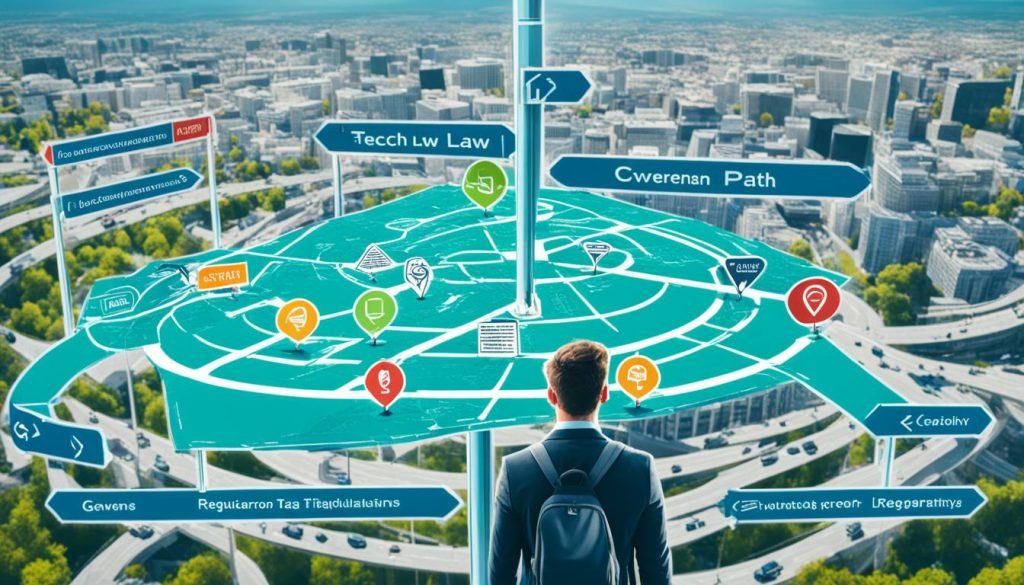As an IT professional, navigating the evolving technology regulatory landscape is paramount for ensuring compliance, safeguarding digital assets, and staying ahead of the complex web of laws and regulations. The rapid pace of technological innovation has created significant challenges for governments, as they struggle to implement effective laws that protect consumer rights and ensure data is being used responsibly.
Regulatory agencies like the Federal Communications Commission (FCC) and the Federal Trade Commission (FTC) are working diligently to address emerging issues such as facial recognition technology, consumer data privacy, and the monetization of user data by tech companies. Understanding and complying with data privacy regulations, cybersecurity standards, and intellectual property laws is essential for IT professionals to mitigate risks and avoid costly penalties.
Proactive compliance and collaboration with international partners can help organizations stay ahead of the curve and contribute to the harmonization of regulatory standards globally. By staying informed and engaged, IT professionals can position their organizations for success in the ever-changing digital landscape.
Key Takeaways
- Staying informed about the evolving technology regulatory landscape is crucial for IT professionals.
- Regulatory agencies are working to address emerging issues like facial recognition, data privacy, and user data monetization.
- Compliance with data privacy, cybersecurity, and intellectual property laws is essential to mitigate risks.
- Proactive compliance and international collaboration can help organizations stay ahead of the curve.
- By staying engaged, IT professionals can contribute to the harmonization of regulatory standards globally.
The Regulatory Struggle to Keep Pace
The rapid pace of technological innovation has created significant challenges for regulatory agencies tasked with navigating the complex web of navigating tech laws, data privacy regulations, and cybersecurity compliance. Emerging technologies like facial recognition, artificial intelligence, and the widespread collection and monetization of consumer data have raised serious concerns around data privacy and civil liberties.
Emerging Technologies and Data Privacy Concerns
Regulatory agencies like the FCC and FTC are struggling to develop timely and reasonable regulations to address these digital consumer rights and emerging technologies governance issues. The rapid advancements in technology have outpaced the ability of policymakers to implement effective laws and regulations to protect consumer interests and ensure responsible cross-border data transfers.
Regulatory Agencies Playing Catch-Up
There is a constant tension between fostering innovation and protecting consumer interests, as tech companies often push the boundaries of “reasonable use” of consumer data. Regulators must find ways to balance these competing priorities, ensuring that technological progress aligns with societal values and individual internet freedom principles.
Balancing Innovation and Consumer Protection
As the tech antitrust laws and ai ethics and regulations continue to evolve, regulators must adapt their approach to ensure a harmonious balance between intellectual property protection, technology licensing, and the preservation of digital consumer rights. This delicate balance is crucial for fostering an environment that encourages blockchain governance and the responsible development of emerging technologies.
Navigating Tech Laws
As an IT professional, navigating the complex web of technology laws and regulations is a critical aspect of my role. To ensure compliance and protect my organization, I must stay informed about the evolving regulatory landscape, particularly in the realms of data privacy, cybersecurity, and intellectual property protection.
Understanding Data Privacy Regulations
Compliance with data privacy regulations like the General Data Protection Regulation (GDPR) and the California Consumer Privacy Act (CCPA) is essential for managing the collection, storage, and use of consumer data. Failure to adhere to these data privacy laws can result in hefty fines and reputational damage. By deeply understanding the requirements and obligations outlined in these regulations, I can implement robust data management practices that safeguard the personal information entrusted to my organization.
Cybersecurity Compliance and Risk Management
Maintaining cybersecurity compliance and effectively managing risk are also top priorities. My organization must meet stringent security standards to protect against cyber threats and mitigate the potential for data breaches. Staying up-to-date on the latest cybersecurity best practices and regulations, such as the Network and Information Systems (NIS) Directive, is crucial for strengthening our defenses and ensuring operational resilience.
Intellectual Property Protection and Licensing
Intellectual property (IP) protection and technology licensing are additional areas of concern for IT professionals. I must ensure that my organization properly licenses software and respects the IP rights of others. Failure to do so can lead to costly legal battles and reputational harm. By staying informed about the latest developments in IP law and technology licensing, I can safeguard my organization’s digital assets and maintain a strong competitive position in the market.

| Regulation | Key Focus | Penalties for Non-Compliance |
|---|---|---|
| General Data Protection Regulation (GDPR) | Comprehensive data privacy and security requirements for the collection, storage, and processing of personal data | Up to 4% of global annual revenue or €20 million, whichever is higher |
| California Consumer Privacy Act (CCPA) | Grants California residents more control over the personal information that businesses collect about them | Fines up to $7,500 per intentional violation and $2,500 per unintentional violation |
| Network and Information Systems (NIS) Directive | Establishes security and reporting requirements for operators of essential services and digital service providers | Fines up to €10 million or 2% of global annual turnover, whichever is higher |
Restoring Human Agency in Tech Progress
While technology has brought about tremendous advances, it has also raised concerns about the erosion of human agency and the need to ensure that technological progress aligns with societal values and interests. Regulations can play a crucial role in restoring human agency by imposing limits and requirements that encourage stakeholders to explore more thoughtful and adaptive solutions.
The Role of Regulations in Ethical Technology Development
Laws like the General Data Protection Regulation (GDPR) have compelled tech companies to prioritize user data protection, thereby empowering individuals to make ethical decisions about the development and application of certain technologies. By fostering meaningful discussions around the regulation of emerging technologies, we can adapt to these changes and exert some control over the direction of our technological progress, ensuring that it serves the greater good and safeguards individual rights.
Aligning Technology with Societal Values and Interests
As the regulatory landscape continues to evolve, IT professionals must stay informed about the latest developments in navigating tech laws, data privacy regulations, cybersecurity compliance, intellectual property protection, and tech antitrust laws. By aligning technology with societal values and interests, we can ensure that the pace of innovation serves the greater good and empowers individuals to make informed choices about the technologies that shape their lives.
EU’s Regulatory Landscape for Cybersecurity
The European Union has been at the forefront of cybersecurity regulation, introducing several key pieces of legislation to enhance the overall cybersecurity compliance of critical infrastructure operators and digital service providers. These regulatory initiatives demonstrate the EU’s commitment to safeguarding digital consumer rights and digital infrastructure in the face of rapidly evolving cyber risks.
Digital Operational Resilience Act (DORA)
The Digital Operational Resilience Act (DORA) aims to strengthen the resilience and cybersecurity of EU financial entities by streamlining and improving previously existing rules and adding new requirements. This legislation is designed to ensure that financial institutions are equipped to withstand and recover from technology-related disruptions, ultimately protecting the stability and integrity of the EU’s financial system.
EU Cyber Resilience Act (CRA)
The proposed EU Cyber Resilience Act (CRA) seeks to establish common cybersecurity standards for products containing digital components, helping to protect consumers from new and emerging cyber threats. By setting these standards, the CRA aims to enhance the security of connected devices and foster a more resilient digital ecosystem across the European Union.
NIS2 Directive
The NIS2 Directive, which came into force in 2023, updates and modernizes the previous Directive on the security of Network and Information Systems (NIS) to address the challenges posed by increasing digitization and evolving cybersecurity threats. This directive expands the scope of the original NIS Directive, strengthening the cybersecurity compliance requirements for a broader range of sectors and organizations operating within the European Union.

Regulatory Enforcement and the End of Tech Exceptionalism
The notion that technology companies are exempt from the same legal rules and regulations that apply to other industries is rapidly coming to an end. Regulators around the world are demonstrating that tech exceptionalism is no longer acceptable. In the United States, the FTC has leveraged existing consumer protection regulations to take action against companies like Epic Games and Amazon for data privacy violations and deceptive design practices. Similarly, the French data protection authority, CNIL, has imposed massive fines on companies like Clearview AI for non-compliance with data protection rules. Ongoing intellectual property lawsuits, such as the one against Microsoft, are also challenging the fundamental business model of generative AI. As courts and regulators continue to apply existing laws and regulations to the tech industry, the days of tech companies operating in a regulatory void are numbered.
The rise of regulatory enforcement signals the end of the tech industry’s long-standing exceptionalism. Companies can no longer rely on the argument that they are disrupting traditional industries and should be given a free pass. Instead, they must demonstrate their commitment to data privacy regulations, cybersecurity compliance, and intellectual property protection. As the regulatory landscape evolves, IT professionals must stay informed and adapt their strategies to navigate the complex web of laws and regulations that govern the tech industry.
The FTC and other regulatory agencies are sending a clear message: technology companies are not above the law. By holding these organizations accountable, regulators are paving the way for a more level playing field, where innovation is balanced with consumer protection and societal interests. This shift towards stricter enforcement will have far-reaching implications for the tech industry, forcing companies to prioritize compliance and align their practices with the evolving legal landscape.
Antitrust and Market Competition in the Tech Sector
Regulators are turning their attention to the pressing issue of antitrust and market competition in the tech sector. Antitrust actions launched in the US and EU in 2023 are calling into question the dominance of companies like Google in the ad tech market, potentially shaking up the programmatic advertising model that has become the foundation of the modern internet. These regulatory efforts aim to address the concentration of power and the anti-competitive practices of Big Tech, ensuring a more level playing field and protecting consumer interests.
Scrutiny of Big Tech’s Dominance and Business Practices
As the regulatory landscape evolves, IT professionals must stay informed about the latest developments in antitrust laws and their implications for the tech industry. The scrutiny of Big Tech’s dominance and business practices is intensifying, with regulators seeking to promote fair competition and prevent the stifling of innovation through the consolidation of power by a few industry giants. This shift in the regulatory focus underscores the need for IT professionals to navigate the complex web of tech antitrust laws and understand their impact on the tech sector’s landscape.

The concentration of power and the anti-competitive practices of Big Tech have become a major concern for regulators, who are determined to ensure a more level playing field and protect consumer interests. IT professionals must stay abreast of these developments and adapt their strategies to align with the changing regulatory environment, fostering innovation and safeguarding the rights of digital consumers.
AI Regulation and Intellectual Property Concerns
The rapid advancements in artificial intelligence (AI) have brought about new regulatory challenges that IT professionals must navigate. OpenAI’s CEO, Sam Altman, has called for global AI regulation, recognizing the need for a coordinated approach to governing this transformative technology. Regulators in Europe have also taken steps to address AI-related concerns, such as the proposed EU AI Act, which aims to establish common standards and requirements for the development and deployment of AI systems.
Calls for Global AI Governance
As AI continues to evolve and become more pervasive, there is a growing consensus that a global regulatory framework is necessary to ensure the responsible and ethical development of these technologies. Experts and industry leaders like Sam Altman have advocated for international collaboration to address the complex issues surrounding AI, from data privacy and algorithmic bias to the potential impact on employment and human rights. By working together to establish clear guidelines and oversight mechanisms, policymakers can help safeguard the interests of individuals and society as a whole.
IP Lawsuits and AI’s Fundamental Business Model
In addition to the calls for AI governance, the tech industry is also facing intellectual property (IP) challenges that could have far-reaching implications for the business models of AI companies. Ongoing lawsuits, such as the one against Microsoft, are questioning the use of data and code created by others as the foundation for generative AI systems. These legal battles highlight the need for IT professionals to stay informed about the evolving regulatory landscape surrounding intellectual property rights and their impact on the tech industry’s ability to innovate and grow.
The Convergence of Law and Technology
The relationship between law and technology is a complex and evolving one. While technology has transformed countless aspects of our lives, it has also raised new challenges around human rights, civil liberties, and consumer rights in the digital age. Regulations like the GDPR and the proposed EU AI Act are examples of how policymakers are seeking to address these issues and ensure that technological progress aligns with fundamental human rights and societal values.
Human Rights and Civil Liberties in the Digital Age
As digital technologies become increasingly pervasive, there is a growing concern about the potential infringement on individual privacy, freedom of expression, and other civil liberties. Policymakers are grappling with the challenge of balancing technological innovation with the protection of fundamental human rights. This convergence of law and technology has far-reaching implications for online content moderation, cross-border data transfers, and the ethical development of emerging technologies like AI.
Consumer Rights and Data Protection
Alongside the concerns around human rights and civil liberties, the rapid advancements in data privacy regulations, cybersecurity compliance, and intellectual property protection have become increasingly crucial. IT professionals must stay informed about the latest developments in navigating tech laws, digital consumer rights, and tech antitrust laws. This knowledge is essential for ensuring that technology is developed and deployed in a manner that respects and protects consumer rights, while also fostering innovation and competition in the tech sector.

Proactive Compliance and International Collaboration
As the regulatory landscape continues to evolve, it is crucial for IT professionals to take a proactive approach to compliance and engage in international collaboration to navigate the complexities of navigating tech laws, data privacy regulations, cybersecurity compliance, and other legal requirements. By adopting best practices and recommendations from regulatory bodies and industry organizations, we can ensure our organizations are prepared to meet the latest compliance requirements.
Adopting Best Practices and Recommendations
Staying informed about the intellectual property protection, technology licensing, and software patents regulations is essential for safeguarding our digital assets. Similarly, understanding digital consumer rights, tech antitrust laws, and blockchain governance helps us align our practices with evolving legal frameworks. Proactively implementing the latest ai ethics and regulations can also demonstrate our commitment to intellectual property rights and responsible technology development.
Harmonizing Standards and Improving Global Cybersecurity
Furthermore, the harmonization of standards and the improvement of global cybersecurity measures are crucial for maintaining operational integrity and building trust in our digital services. By actively engaging with antitrust laws, online content moderation, and emerging technologies governance, we can contribute to the development of common frameworks that enhance cross-border data transfers and artificial intelligence ethics. This collaborative approach, guided by internet freedom principles, will better equip us to guide our organizations through the ever-changing tech legal landscape.
Conclusion
In conclusion, keeping up with the rapidly evolving technology regulatory landscape is essential for me as an IT professional to ensure compliance, protect digital assets, and navigate the complex web of laws and regulations. From data privacy and cybersecurity to intellectual property and antitrust concerns, I must stay informed about the latest developments in order to mitigate risks and align my organization with societal values and consumer interests. By proactively engaging with the regulatory process and collaborating with international partners, I can contribute to the harmonization of standards and the improvement of global cybersecurity, ultimately positioning my organization for success in the digital age.
Navigating the ever-changing technology laws and regulations is crucial for me to safeguard my organization’s operations, uphold data privacy, and maintain intellectual property rights. Cybersecurity compliance, technology licensing, and software patents are just a few of the areas I must continuously monitor to ensure my organization remains compliant and protected. Furthermore, the rise of emerging technologies, such as artificial intelligence and blockchain, has introduced new governance challenges that I must stay attuned to, ensuring my organization’s practices align with ethical principles and consumer rights.
As the digital landscape evolves, the convergence of law and technology will only become more pronounced. Staying ahead of the curve requires a collaborative approach, where I work closely with regulatory agencies, industry groups, and global partners to harmonize standards and improve cross-border data transfers. By adopting best practices and proactively addressing emerging concerns, I can position my organization as a leader in the responsible development and deployment of innovative technologies, ultimately contributing to a more secure and equitable digital future.
FAQ
Why is it crucial for IT professionals to stay informed about the evolving technology regulatory landscape?
As an IT professional, staying informed about the evolving technology regulatory landscape is crucial for ensuring compliance, protecting digital assets, and navigating the complex web of laws and regulations. The rapid pace of technological innovation has created significant challenges for regulatory agencies, and IT professionals must understand and comply with data privacy regulations, cybersecurity standards, and intellectual property laws to mitigate risks and avoid costly penalties.
What challenges are regulatory agencies facing in keeping up with emerging technologies?
Emerging technologies like facial recognition, artificial intelligence, and the widespread collection and monetization of consumer data have raised serious concerns around data privacy and civil liberties. Regulatory agencies like the FCC and FTC are struggling to develop timely and reasonable regulations to address these issues, as there is a constant tension between fostering innovation and protecting consumer interests.
What are the key areas of concern for IT professionals when it comes to navigating tech laws?
IT professionals must navigate a complex web of laws and regulations to ensure compliance and protect their organizations. Understanding data privacy regulations like the GDPR and CCPA is essential for managing the collection, storage, and use of consumer data. Cybersecurity compliance and risk management, as well as intellectual property protection and technology licensing, are additional areas of concern that IT professionals must stay informed about.
How can regulations help restore human agency in the face of rapid technological progress?
Regulations can play a crucial role in restoring human agency by imposing limits and requirements that encourage stakeholders to explore more thoughtful and adaptive solutions. Laws like the GDPR have compelled tech companies to prioritize user data protection, thereby empowering individuals to make ethical decisions about the development and application of certain technologies.
What are some of the key cybersecurity regulations introduced by the European Union?
The European Union has been at the forefront of cybersecurity regulation, introducing several key pieces of legislation to enhance the overall cybersecurity posture of critical infrastructure operators and digital service providers. These include the Digital Operational Resilience Act (DORA), the proposed EU Cyber Resilience Act (CRA), and the NIS2 Directive, which aim to strengthen the resilience and cybersecurity of EU digital infrastructure and consumer rights.
How are regulators challenging the notion of “tech exceptionalism”?
The notion that technology companies are exempt from the same legal rules and regulations that apply to other industries is rapidly coming to an end. Regulators around the world are demonstrating that tech exceptionalism is no longer acceptable, as they leverage existing consumer protection regulations and intellectual property laws to take action against tech companies for data privacy violations, deceptive design practices, and other non-compliance issues.
How are regulators addressing antitrust and market competition concerns in the tech sector?
Regulators are turning their attention to the issue of antitrust and market competition in the tech sector. Antitrust actions launched in the US and EU in 2023 are calling into question the dominance of companies like Google in the ad tech market, potentially shaking up the programmatic advertising model that has become the foundation of the modern internet. These regulatory efforts aim to address the concentration of power and the anti-competitive practices of Big Tech, ensuring a more level playing field and protecting consumer interests.
What are the key regulatory challenges surrounding artificial intelligence (AI)?
The rapid advancements in artificial intelligence (AI) have brought about new regulatory challenges. Regulators in Europe have taken steps to address AI-related concerns, such as the proposed EU AI Act, while ongoing intellectual property lawsuits are challenging the fundamental business model of generative AI, which relies on the use of data and code created by others. IT professionals must stay informed about the evolving regulatory landscape surrounding AI and intellectual property rights.
How is the convergence of law and technology impacting consumer rights and civil liberties?
The relationship between law and technology is a complex and evolving one. Regulations like the GDPR and the proposed EU AI Act are examples of how policymakers are seeking to address issues around human rights, civil liberties, and consumer rights in the digital age. IT professionals must stay informed about the latest developments in this convergence, as they have far-reaching implications for data protection, online content moderation, cross-border data transfers, and the ethical development of emerging technologies.
What are the key strategies for IT professionals to navigate the evolving tech legal landscape?
IT professionals must take a proactive approach to compliance and engage in international collaboration to navigate the complexities of tech laws and regulations. By adopting best practices and recommendations from regulatory bodies and industry organizations, and by collaborating to harmonize standards and improve global cybersecurity measures, IT professionals can ensure their organizations are prepared to meet the latest compliance requirements and maintain operational integrity in the digital age.

